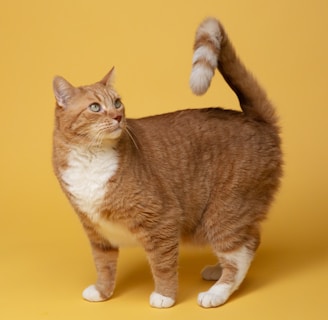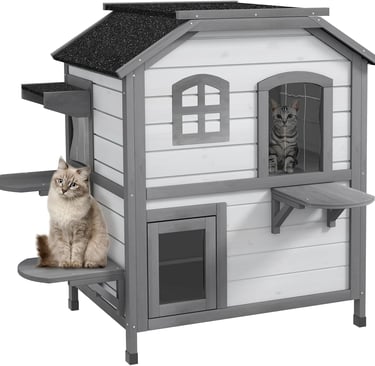Cats can help with your Mental Health
In today's fast-paced, always-connected world, mental health has become a pressing concern for millions. More people than ever are dealing with anxiety, stress, and depression—making it essential to find supportive tools and healthy coping mechanisms. While traditional treatments such as therapy and medication remain vital, there's an unexpected yet powerful ally that many overlook: cats.
CATS
Bryan Thompson
4/7/20254 min read


Our Cats do more than just curl up on your lap or knock things off shelves—they can also play a significant role in improving emotional well-being. In this blog, we’ll explore how cats can help your mental health, looking at real reasons, scientific research, and practical outcomes.
Whether you already have a cat or are considering adopting one, read on to learn how they might just be the emotional support you’ve been looking for.
The Rise of Mental Health Struggles in Modern Society
Before diving into how cats can support mental well-being, it’s important to understand the mental health landscape today. According to the World Health Organization (WHO), one in every eight people in the world lives with a mental disorder. Depression and anxiety have skyrocketed, especially following global events like the COVID-19 pandemic, which triggered isolation, uncertainty, and increased stress levels across all age groups.
Workplace burnout, academic pressure, financial worries, and even social media have also contributed to rising cases of anxiety and depression. As awareness grows, so does the need for alternative or complementary therapies—and that's where pets, particularly cats, come into the picture.
1. Cats Reduce Stress Through Physical Interaction
One of the most immediate ways cats can help your mental health is through touch. Petting a cat, listening to its purr, or simply having it sit in your lap can trigger the release of oxytocin, a hormone known to reduce stress and foster bonding.
How it Helps:
Petting a cat lowers cortisol levels (the stress hormone).
The rhythmic act of stroking a cat can be meditative.
Cats often seek physical contact during times of rest, creating a calming presence.
Results: Studies have shown that people who engage in regular physical interaction with their cats experience lower blood pressure and report feeling calmer and more centered. Even short 10-minute sessions of petting a cat can make a measurable difference in stress markers.
2. Companionship and Reducing Feelings of Loneliness
Loneliness is one of the biggest mental health challenges in modern society. People live farther from family, work remotely, and often spend long hours alone. Cats can help your mental health by providing consistent companionship without the high demands some pets (like dogs) require.
How it Helps:
Cats are often nearby and observant, providing subtle emotional support.
Their presence makes a home feel alive and less empty.
Caring for a cat gives people a daily routine and purpose.
Results: Cat owners frequently report that having a cat makes them feel less alone and more connected. In surveys, many people say their cats "understand them" and are a steady emotional presence during hard times.
3. Cats Promote Mindfulness and Present-Moment Awareness
Mental health struggles often come from dwelling on the past or worrying about the future. Cats can help your mental health by anchoring you in the present moment. Their movements, behaviors, and need for care create mindfulness opportunities throughout the day.
How it Helps:
Watching a cat play, stretch, or sleep encourages you to slow down.
Feeding, grooming, and playing with your cat fosters intentional daily rituals.
Cats’ curious nature inspires you to observe and engage more with your environment.
Results: Mindfulness has been shown to reduce anxiety, increase focus, and improve emotional resilience. Cat owners often find themselves practicing mindfulness unconsciously by simply spending time observing or interacting with their cats.
4. Emotional Regulation and Routine Support
People struggling with anxiety or depression often benefit from structured routines. Cats, with their predictable needs and habits, provide exactly that. Having a cat encourages daily responsibility while also offering emotional rewards through their affection and presence.
How it Helps:
Feeding, cleaning litter boxes, and playtime add routine to your day.
Cats are intuitive and can respond to your mood—some even cuddle more when you're down.
Interacting with a calm cat can help regulate your nervous system.
Results: A steady daily rhythm can help reduce depressive symptoms. Cat owners with mental health conditions often say their cat gives them “a reason to get out of bed,” especially on difficult days. The emotional regulation gained from the routine is a powerful tool for long-term mental health.
See the- Out Door Cat House
5. Non-judgmental support and Emotional Safety
Sometimes, what we need most is someone to be there without judgment, criticism, or conversation. Cats provide unconditional companionship. They don’t care what you look like, what you did wrong, or how you’re feeling—they’re just there.
How it Helps:
Their neutrality creates a non-threatening environment.
Being around a cat offers comfort and predictability.
Results: Many therapists recommend pets for emotional support, particularly for those with PTSD or social anxiety. People with cats often feel safer, less judged, and more emotionally stable at home. This unique form of silent support creates a “safe zone,” which is vital for healing and emotional recovery.
Conclusion: The Silent Healers in Fur
Mental health challenges are complex and different for everyone, but one thing is clear: Emotional support comes in many forms—and sometimes, it purrs. Cats can help your mental health by reducing stress, combatting loneliness, encouraging mindfulness, offering routine, and providing quiet emotional safety.
While owning a cat is not a replacement for professional mental health treatment, it is a proven complement. Whether you're living with anxiety, navigating stress at work, or simply looking for a greater sense of peace at home, a cat might just be the companion you didn’t know you needed.
So if you’ve ever considered adopting a feline friend, know this: Cats can help your mental health in profound, science-backed ways. Their love may be quiet, but its impact is lasting. Don’t underestimate the power of a purr.



